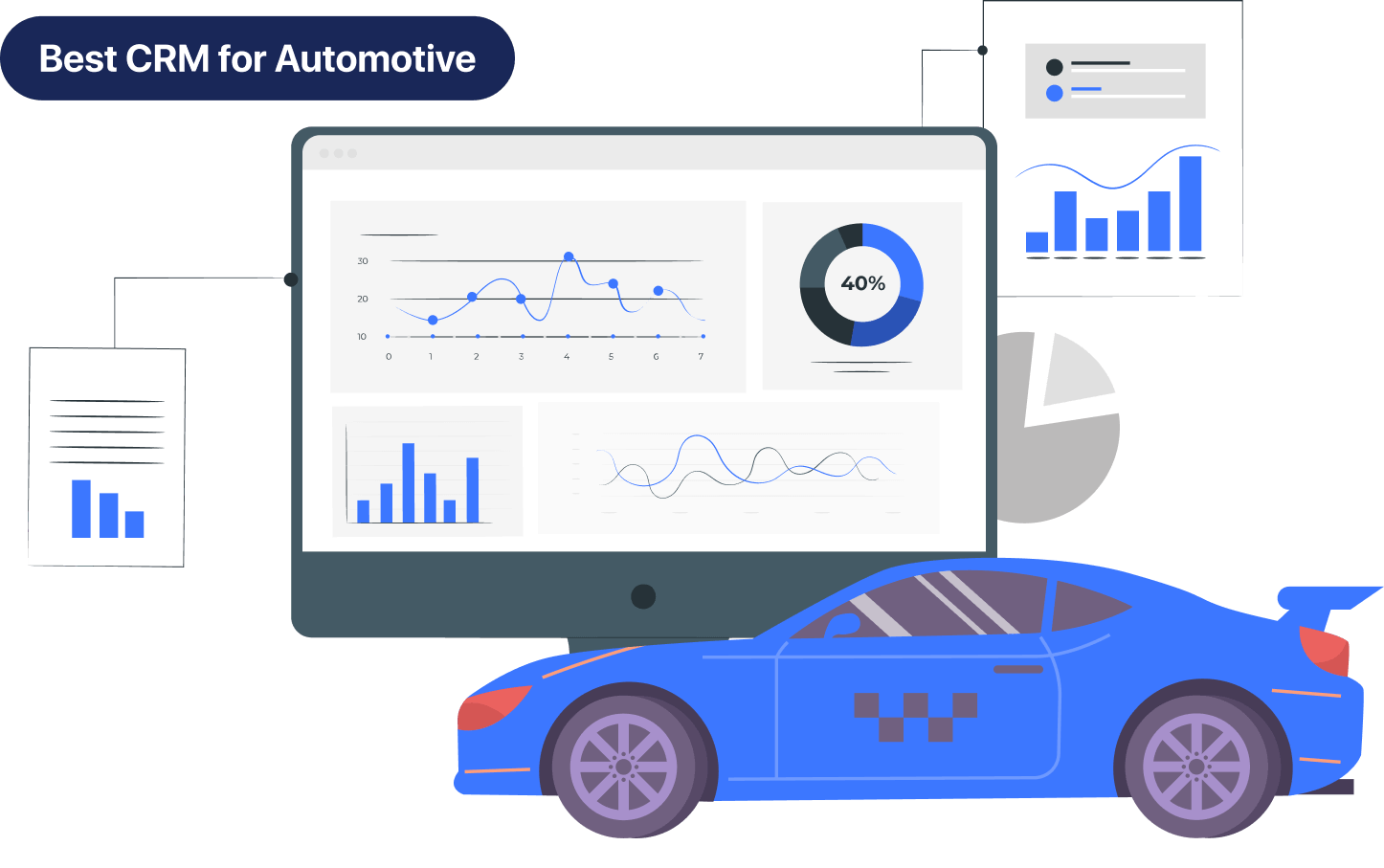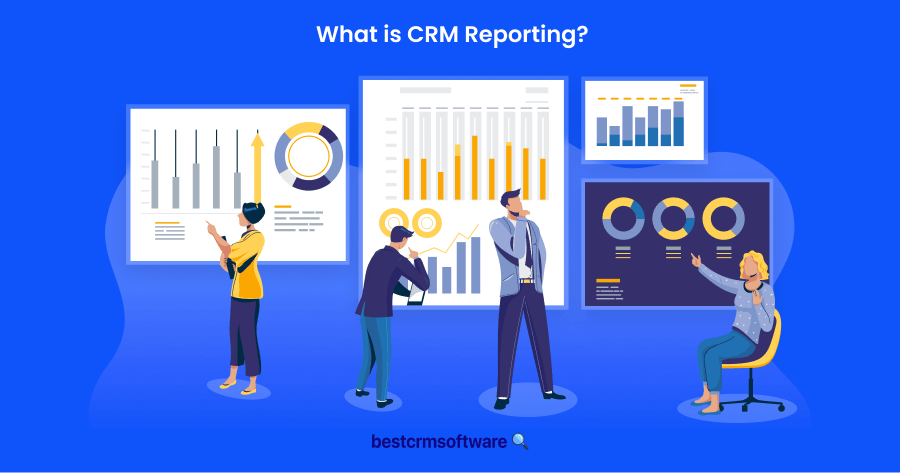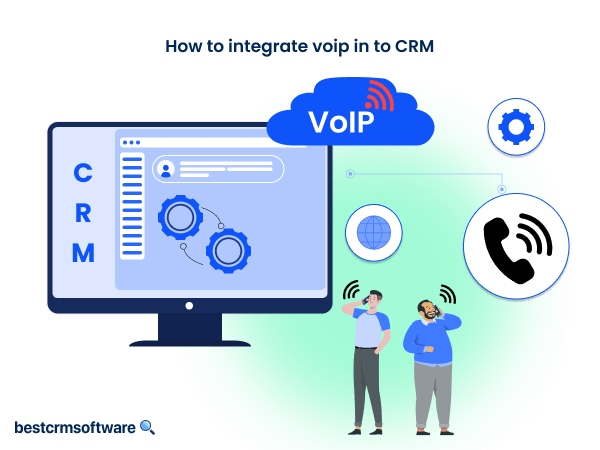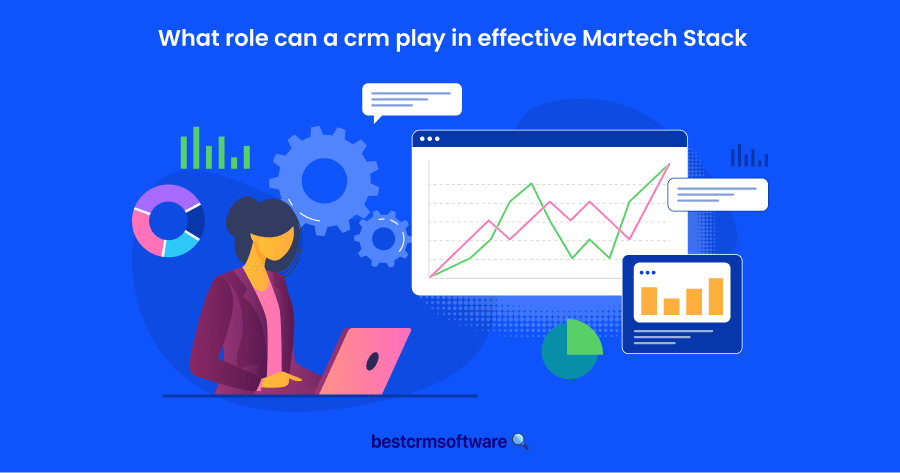
Best CRM Software for Automotive
In a Nutshell
As a seasoned CRM manager, I’ve conducted many analyses of various CRM platforms tailored explicitly to the dynamic needs of the automotive industry. Among the plenty of options, one standout solution is ProMax CRM. With its renowned, comprehensive suite of features and intuitive interface, it seamlessly integrates with car dealerships’ intricate workflows. In turn, this empowers them to maximize sales potential while optimizing operational efficiency.
However, while ProMax may excel in certain aspects, alternatives such as Salesforce Automotive Cloud and VinSolutions offer compelling features tailored to the automotive industry’s demands, too. Ultimately, the best CRM choice will hinge on your business’s specific requirements and objectives
The 10 Best CRM Software for the Automotive Industry Shortlist
- ProMax CRM — Best for car dealership operations, ensuring no sales opportunities are missed.
- Salesforce Automotive Cloud — Best CRM solution for dealerships and manufacturers.
- AutoXplorer — Best suite designed to streamline core operations.
- HubSpot — Most flexible CRM platform adaptable to various automotive business models.
- DealerPeak — Best automotive CRM software designed for customer data management and deal desking.
- Bonsai CRM — Most user-friendly and affordable option for dealerships of all sizes.
- eLEAD CRM — Best software solution catering to the automotive industry.
- Freshsales — Best cloud-based CRM known for its effective automation and extensive integrations.
- VinSolutions CRM — Most streamlined sales processes for improving customer experience.
- DealerSocket — Best unified platform for integrating sales, marketing, service, and desking tools.
Introduction
The automotive industry is a fiercely competitive landscape where customer satisfaction reigns supreme. In this environment, building strong relationships and streamlining operations are essential for success.
Enter the Customer Relationship Management (CRM) system, a powerful tool that can transform the way your automotive business interacts with customers.
This article explores the advantages of a CRM system, delves into the unique considerations for small and large automotive businesses when choosing one, and highlights key factors to ensure you select the best fit for your organization.
What Is a CRM for Automotive?
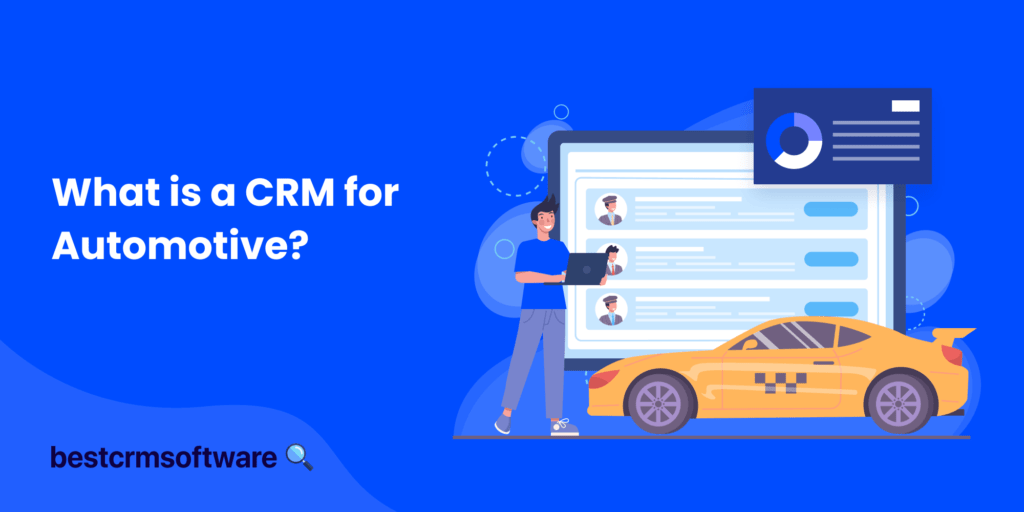
An Automotive CRM is a software solution specifically designed to cater to the needs of businesses in the automotive industry. While general CRMs provide a strong foundation, an automotive CRM goes a step further by incorporating features and functionalities that are particularly relevant to car dealerships, repair shops, and other automotive organizations.
It provides tools to qualify these leads, track their online behavior and interests, and nurture them through the sales funnel with targeted communication. Many dealerships already use dealer management system (DMS) software to manage inventory, sales processes, and service appointments.
An automotive CRM integrates seamlessly with existing DMS systems, eliminating the need for duplicate data entry. This ensures all customer information, purchase history, and service records are centralized in one location for easy access by sales, service, and marketing teams.
Why Does an Automotive Business Need a CRM?
Here’s why your automotive business needs a CRM system:
- Enhancing Customer Retention
Traditionally, keeping customers engaged after a purchase relied on memory and scattered notes. A CRM changes that. It centralizes all customer information, purchase history, and service interactions.
This allows you to personalize communication. Imagine sending birthday greetings with exclusive service discounts or reaching out proactively with reminders for recommended maintenance based on their mileage. These small touches demonstrate that you value their business and go a long way in building loyalty.
A CRM also empowers you to identify potential dissatisfaction early on. By tracking customer service interactions, you can address concerns swiftly and efficiently, preventing negative experiences from escalating and potentially leading to customer churn. - Streamlining Marketing Activities
Generating leads and nurturing them through the sales funnel can be a time-consuming and complex process. A CRM acts as a central hub for all your marketing data. It allows you to track the effectiveness of different campaigns across various channels, from social media to email marketing.
By analyzing this data, you can identify which campaigns resonate most with your target audience and adjust your strategies accordingly. The CRM also helps you manage leads effectively. No more lost sticky notes or forgotten follow-ups.
You can automate lead nurturing sequences, schedule personalized email campaigns, and ensure no potential customer falls through the cracks. - Better Customer Segmentation
Not all customers are created equal. A CRM allows you to segment your customer base based on demographics, buying habits, and service needs. This empowers you to create targeted marketing campaigns that truly resonate with each segment.
For instance, you can highlight fuel-efficient models to customers concerned about rising gas prices or send personalized offers for performance upgrades to driving enthusiasts. This laser-focused approach delivers a more relevant message to each customer, increasing engagement and conversion rates. - Cost Savings
A CRM isn’t just about generating sales; it’s also about saving you money. Streamlined marketing efforts eliminate wasted resources on ineffective campaigns. By identifying high-value leads and targeting them with relevant messaging, you can maximize your marketing return on investment (ROI).
Improved customer service reduces repeat calls and customer churn, lowering overall costs. Additionally, a CRM can automate tasks like appointment reminders and follow-up emails, freeing up valuable staff time for more complex tasks.
The Top 10 Best CRM Tools for the Automotive Industry
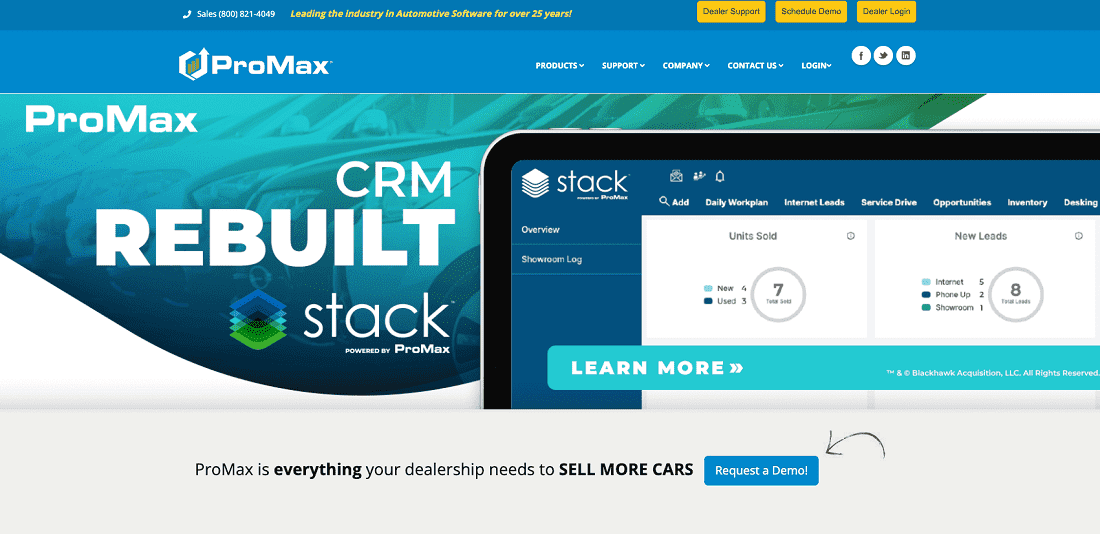
ProMax is a big name in the car dealership CRM software field. It offers a mix of strong features and solutions that focus on making dealership tasks easier. One of its best parts is its CRM system, which is like the heart of digital operations for dealerships.
It’s great at keeping track of customer interactions, making sure no sales chances are missed. What’s cool about ProMax’s CRM is that it doesn’t just store customer info but also helps reach out to them, turning potential buyers into actual customers and making sure they keep coming back.
Why I Like It
At the core of ProMax’s offerings is the Desking tool, showcasing the company’s grasp of the car dealership sales cycle. This feature excels at pairing potential buyers with suitable vehicles and financing choices, greatly boosting profit potential.
It’s a mutually beneficial solution, streamlining the intricate process of financing and vehicle selection for both the dealership and the customer.
Key Features for Automotive
- Track all leads, no matter where they come from.
- Efficiently follow up using built-in procedures.
- Access the mobile app from your smartphone or tablet.
- Automate email campaigns effortlessly.
- Text directly from the CRM platform.
- Simplify daily sales department tasks with easy-to-use work plans.
- Manage inventory and expenses for any volume of vehicle sales.
- Instantly market to potential customers with integrated e-brochures.
Pros
- Provides various services like CRM, desking, and credit solutions.
- Offers dealership website services and lead-generation tools to boost online visibility.
- Call tracking services improve marketing ROI by efficiently monitoring ad sources.
Cons
- A wide range of services might take a while to set up and connect.
- Some dealerships might find the features too complicated for what they need.
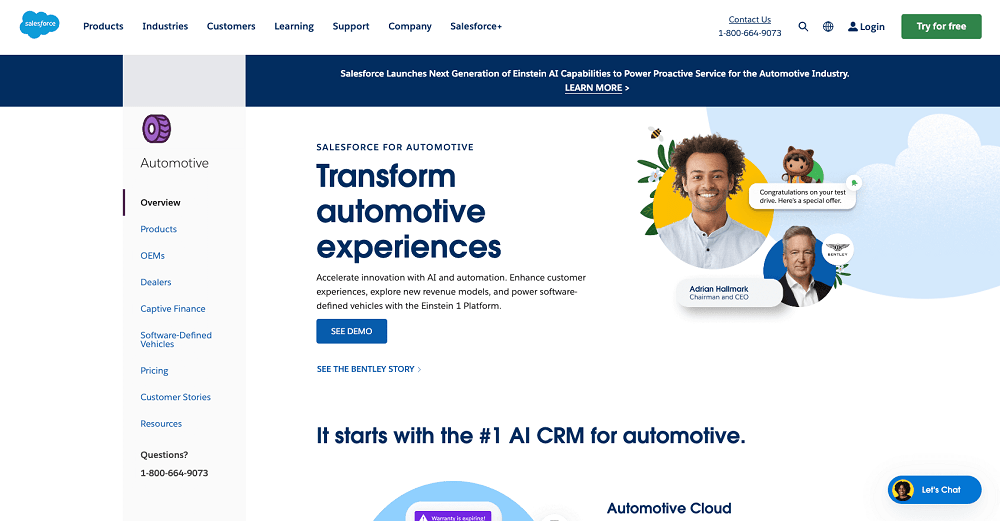
Salesforce caters to the automotive industry with a specialized solution called Salesforce Automotive Cloud. This cloud-based CRM is built on the robust Salesforce Customer 360 platform, allowing it to be tailored to the specific needs of car dealerships and manufacturers.
Why I Like It
I checked out the inventory management in Automotive Cloud. It lets you track lots of spare parts across different warehouses and locations without having to add each item manually. This is handy for big dealerships with hundreds or thousands of items in stock.
Key Features for Automotive
- Automates car sales tasks, freeing up time for customer connection.
- Manages all customer touchpoints (online, social media, showroom, etc.) for a unified buying experience.
- Enables collaboration between dealerships and OEMs for sales, inventory, and service improvement.
- Tracks the entire customer journey (inquiry to service) for targeted marketing, relevant recommendations, and exceptional service that builds loyalty.
- Provides powerful analytics for customer behavior, sales, and marketing to optimize dealership processes.
Pros
- AI tools provide thorough analytics.
- Effortless integration with Slack.
- Customized messages and emails.
- AI streamlines difficult tasks.
Cons
- Hidden pricing tactics and pricey
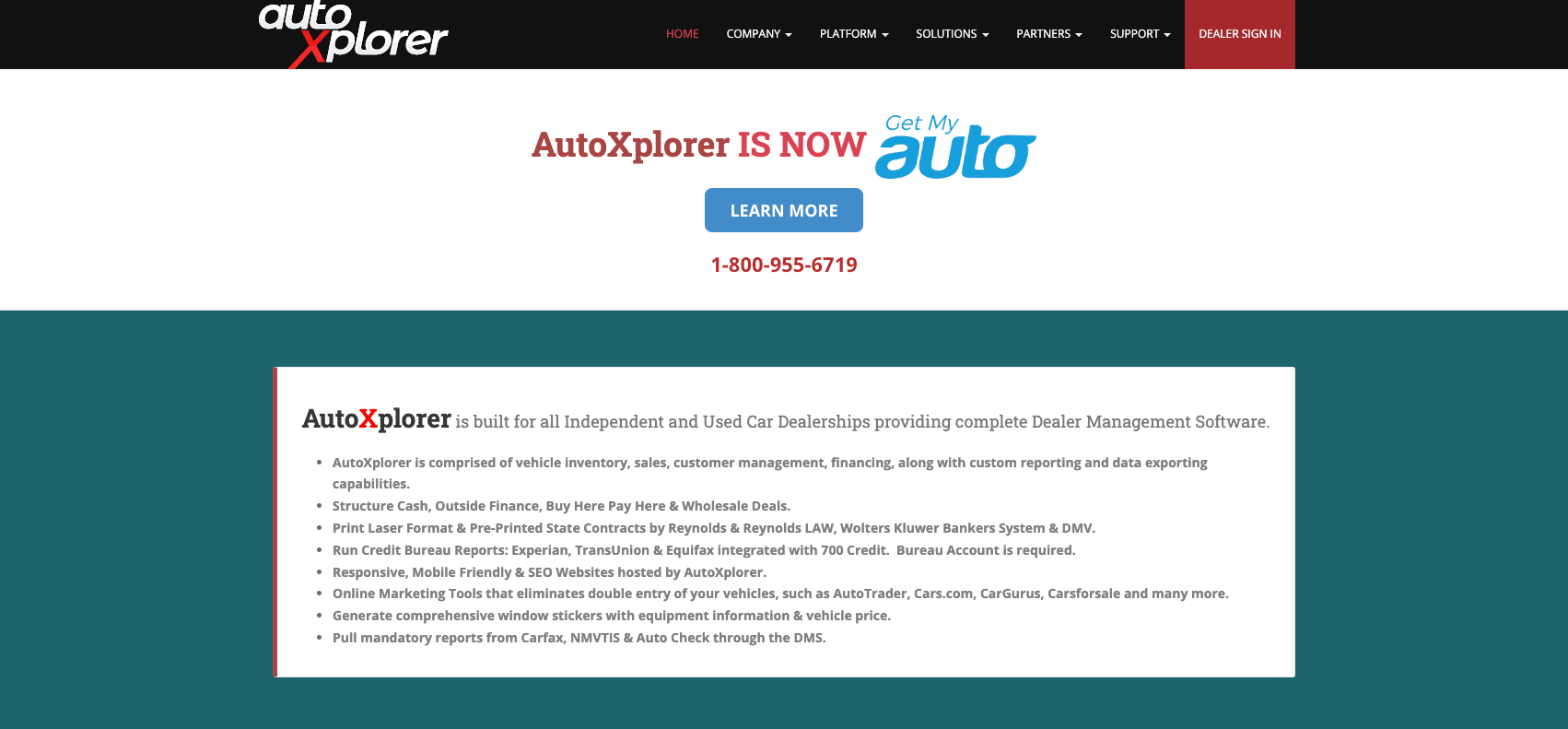
AutoXplorer is a software suite designed to streamline core operations for independent and used car dealerships. It combines various functionalities into one platform. You can track vehicle details and pricing and manage availability. Sales management activities like lead tracking, deal structuring, and sales pipeline management can also be done.
Why I Like It
For independent and used car dealerships that prioritize an all-in-one solution and don’t require a super strong CRM component, AutoXplorer offers several advantages. It simplifies management processes, streamlines sales workflows, and could potentially be a cost-effective option.
Key Features for Automotive
- Integrations with credit bureaus and tools to manage financing options for customers.
- Custom features for independent and used car dealers, covering pre-owned inventory and financing.
- Lead tracking, deal structuring, and credit bureau integration.
- Built-in website creation tools and integrations with car listing platforms.
- Generate reports on sales, inventory, and customer data for better decision-making.
Pros
- Simplified platform for easier management.
- Core features cater to dealership needs.
- Cost-effective solution for smaller dealers.
- Enhanced efficiency through automation.
Cons
- Basic CRM features; lacks advanced tools.
- May not scale for larger dealerships.
- No free version

HubSpot is a comprehensive CRM platform offering a suite of marketing, sales, and service tools. While not an industry-specific DMS, it can be customized to manage key aspects of an automotive business.
Why I Like It
HubSpot excels at inbound marketing, a strategy that attracts potential customers through valuable content and builds relationships over time. This aligns well with the modern car-buying journey, where customers often research extensively online before visiting a dealership.
Key Features for Automotive
- Detailed customer profiles, purchase, service, and communication history tracking.
- Lead tracking, deal management, and revenue forecasting.
- Segmented campaigns across email, social, and website.
- Service requests, appointments, and customer satisfaction tracking.
- Sales, marketing, and customer interaction insights.
Pros
- Adaptable to various automotive business models
- Can grow with your business
- Combines marketing, sales, and service tools
- Reporting and analytics help make informed decisions based on customer data
Cons
- Lacks some industry-specific features
- Customization can be complex
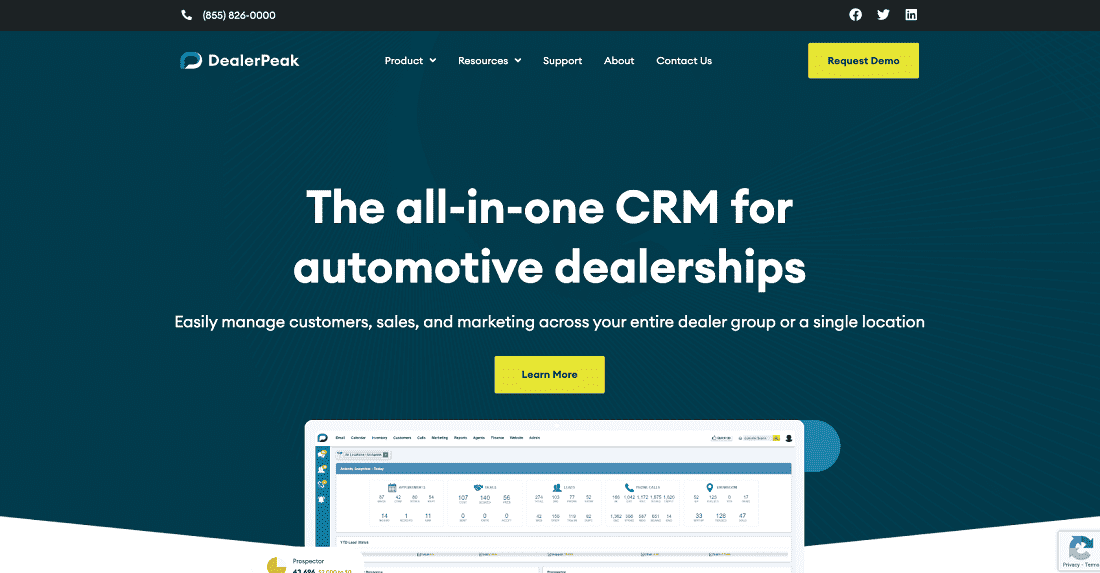
DealerPeak is a CRM software specifically designed for the automotive industry. It caters to auto groups, offering features to manage dealerships across an entire network. With this automotive CRM, you can manage customer data, sales, and marketing efforts for all dealerships within a group from a single platform.
Why I Like It
DealerPeak shines in its robust deal desking features. Imagine a one-click, configurable platform that allows you to seamlessly switch between vehicles, access lender-accurate data, and optimize pricing strategies. This translates to faster deal approvals, happier customers, and potentially increased profitability for your dealership.
Key Features for Automotive
- Automate tasks and personalize the CRM to match your existing dealership processes.
- Tools for managing deals, including trade-in appraisals, credit checks, and equity mining.
- Track and manage your vehicle inventory with ease.
- Integrated text, phone, and mobile app for efficient customer communication.
- Integrates with other dealership software you might already be using.
- Customize the platform with your dealership branding.
Pros
- Designed specifically for the auto industry.
- Manages dealerships across an entire group efficiently.
- Saves time by automating repetitive tasks.
- Adapts to existing workflows and branding.
Cons
- Pricing is not transparent.
- Setting up can be complex.

Bonsai CRM offers a different approach to customer relationship management in the automotive industry. Unlike DealerPeak, which caters to large auto groups, Bonsai focuses on providing a user-friendly and affordable CRM for dealerships of all sizes, including independent ones.
Why I Like It
Bonsai is a solid CRM option for independent dealerships and smaller auto groups seeking a user-friendly and affordable solution. Its all-in-one approach and focus on lead management make it a good choice for dealerships looking to streamline their sales process and customer interactions.
Key Features for Automotive
- Combines CRM functionalities with tools for accounting, expense tracking, task management, and time tracking.
- Capture leads from various sources, nurture them with automated workflows, and prioritize high-potential contacts.
- Track deals through different stages, identify bottlenecks, and improve your sales process.
- Manage interactions with customers through email, phone, and built-in forms.
- Tailor lead scoring rules, create custom tags for contacts, and personalize the CRM to your dealership’s workflow.
Pros
- User-friendly interface.
- Caters to the needs of single dealerships.
- Combines CRM with other business management tools.
- Helps to capture and nurture leads.
Cons
- Cannot manage a large network of dealerships.
- Lack of in-depth customization.
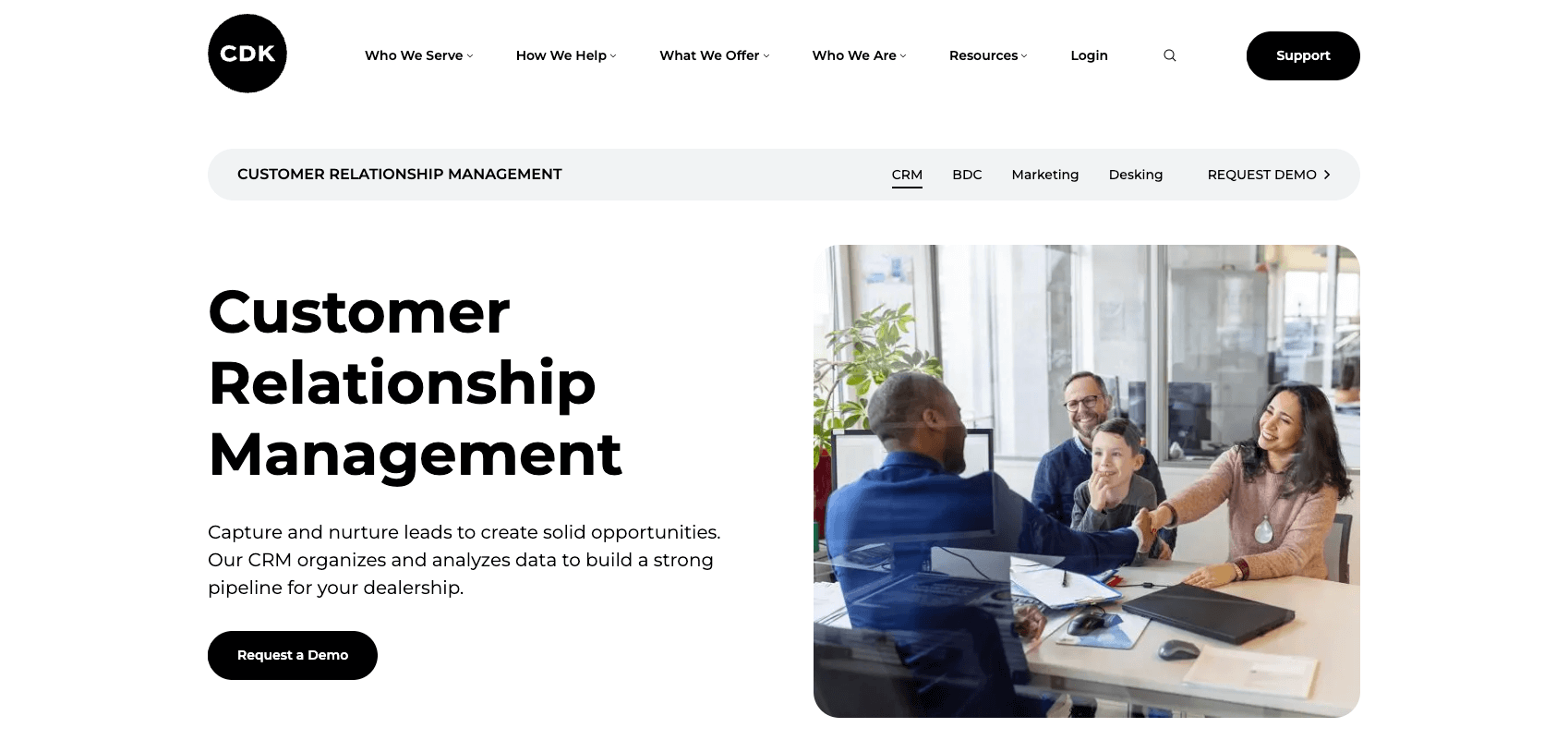
eLEAD CRM is a software solution designed specifically for the automotive industry to manage customer relationships throughout the sales and service lifecycle. Whether a customer walks onto your showroom floor, browses your website, or gives you a call, eLEAD captures and organizes that lead, equipping your sales team with the vital information they need to convert interest into a sale.
Why I Like It
eLEAD CRM goes beyond managing leads. It helps dealerships identify existing customers likely to have high-equity trade-ins through VIN Scanning and Equity Data Mining. This empowers dealerships to target these customers with personalized upgrade offers, boosting used car inventory and creating additional sales opportunities.
Key Features for Automotive
- Efficiently capture and track leads from various sources.
- Visualize the sales process and track lead progress.
- Facilitate communication with customers via email, text, and calls.
- Access and manage data on-the-go with the eLEAD CRM mobile app.
- Improve after-sales service with personalized experiences.
Pros
- Industry-specific features for automotive dealerships, enhancing usability.
- Streamlined lead management boosts sales efficiency.
- Personalized communication improves customer experience.
- Mobile apps ensure productivity on the go.
Cons
- Scalability for large dealerships may be limited.
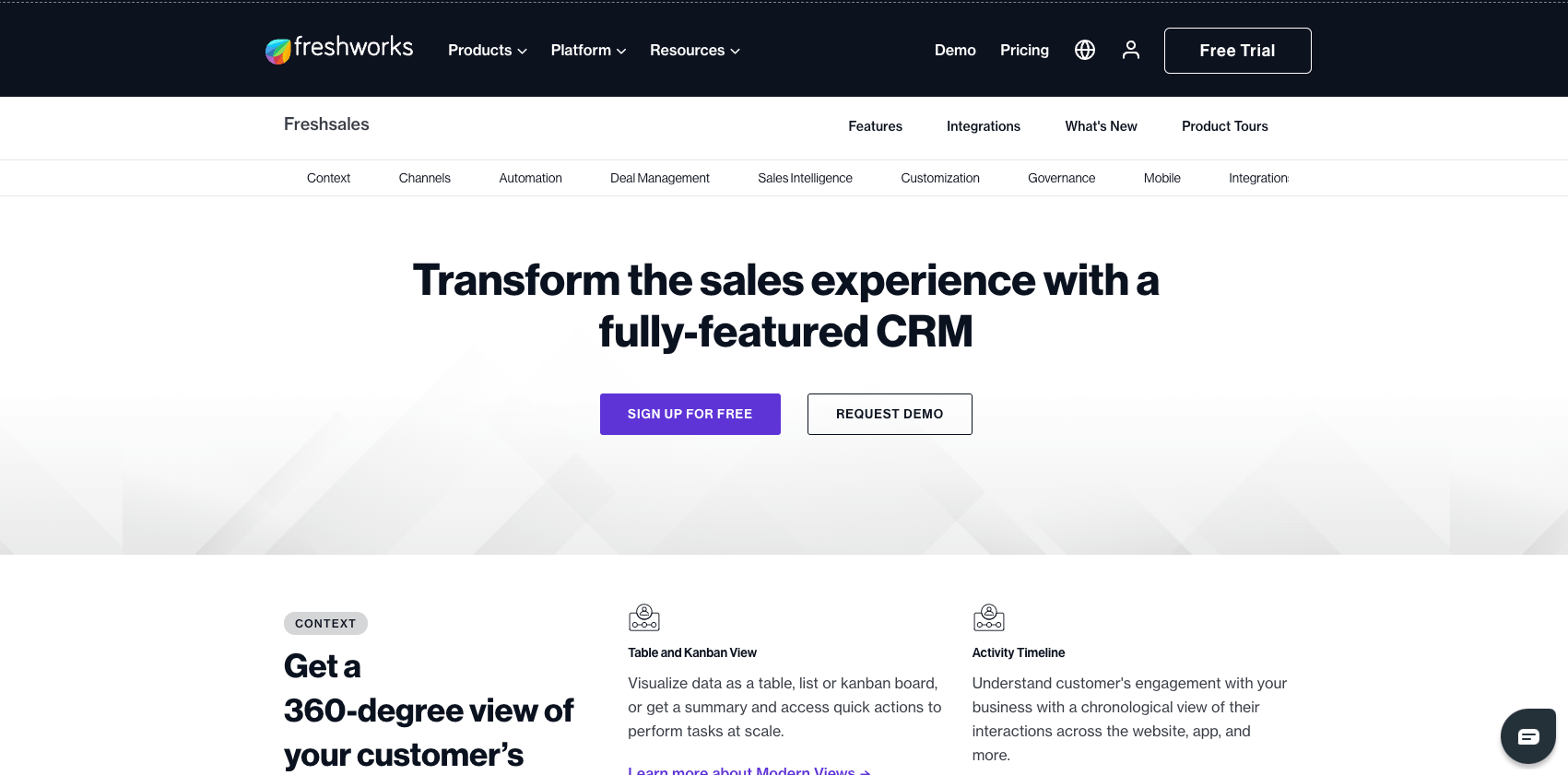
Freshsales is a cloud-based CRM software designed to help businesses manage leads, contacts, and deals. Freshsales is highly regarded among automotive sales teams for its excellent CRM capabilities, including effective automation and extensive integrations, all offered at a remarkably affordable rate.
Key Features for Automotive
- Offers a unique built-in phone system, enabling direct lead connection without separate lines.
- Connect seamlessly with customers across various channels like Facebook, WhatsApp, and SMS.
- Efficiently capture, qualify, and nurture leads through the sales funnel.
- Automate repetitive tasks such as follow-up emails, appointment scheduling, and lead assignment.
- Gain valuable insights into sales performance and trends for informed decision-making through comprehensive reporting and analytics.
Pros
- Omnichannel communication to reach customers on their preferred platform.
- Streamlined lead nurturing and deal tracking.
- Save time and improve efficiency with automated workflows.
- Built-in phone system for centralized communication.
Cons
- May require additional training to learn the built-in system.
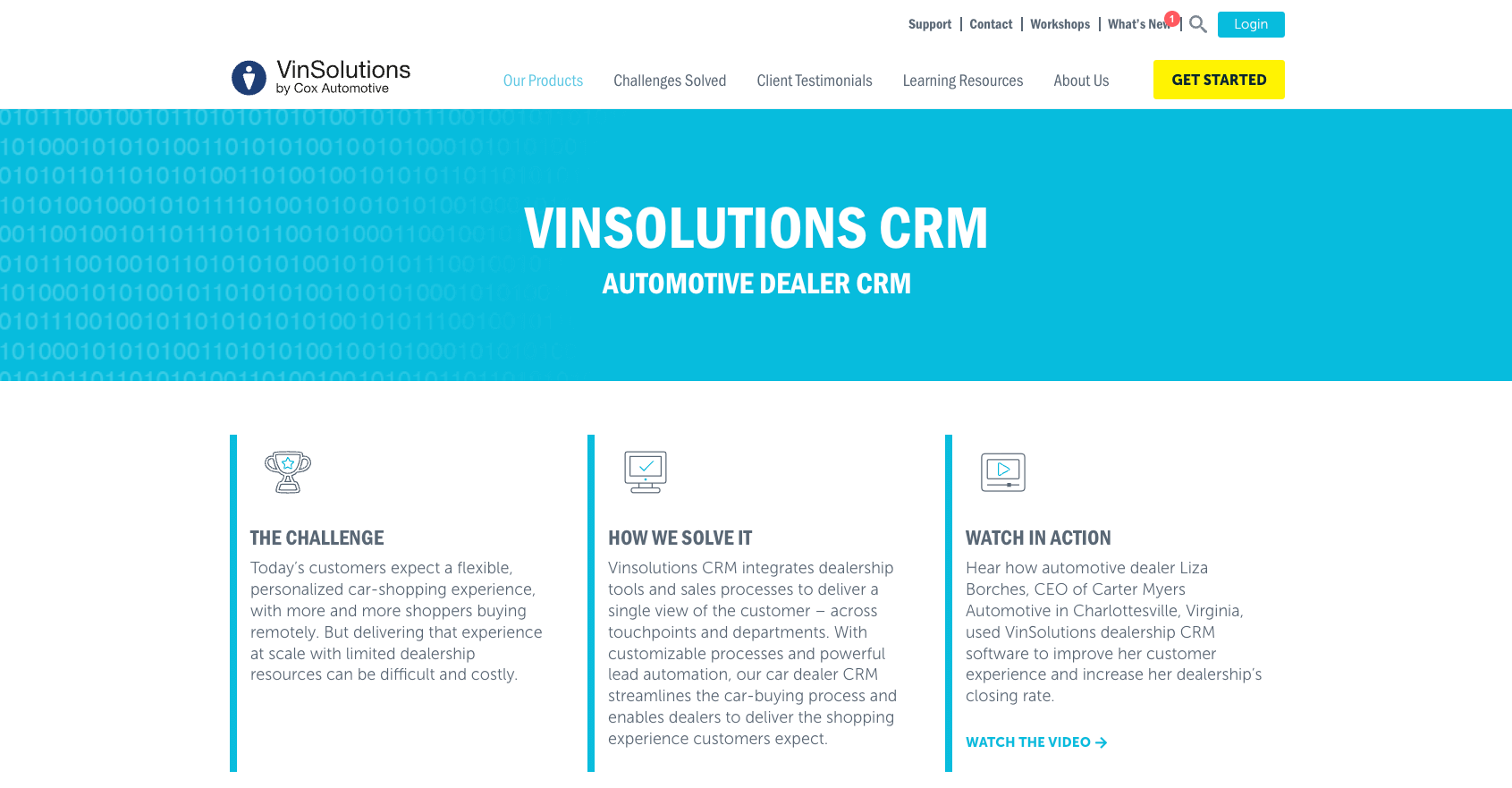
VinSolutions CRM helps car dealerships streamline their sales process, improve customer experience, and ultimately sell more cars. It goes beyond basic contact management by offering features like lead nurturing tools, a mobile app for on-the-go communication, and vehicle interest tracking to ensure dealerships stay connected and informed throughout the customer journey.
Why I Like It
One of the strongest reasons to recommend VinSolutions is its deep integration with Cox Automotive data and software. This gives dealerships a unique advantage in understanding their customers and targeting them with the right message at the right time. By leveraging these insights, dealerships can significantly improve lead conversion rates and customer satisfaction.
Key Features for Automotive
- Integrates data from various dealership tools and departments to provide a complete picture of each customer’s interactions.
- Streamlines the sales process by automating tasks like lead nurturing and follow-up emails.
- Enables dealerships to tailor the CRM to their specific workflows and update them as needed.
- VinSolutions Automotive Intelligence leverages Cox Automotive data to understand customer behavior and target them effectively.
- Dedicated performance managers with experience in retail automotive sales.
Pros
- Boost sales efficiency with automation and insights.
- Enhance customer experience through personalized communication.
- Identify qualified leads and seize sales opportunities.
- Tailor to each dealership’s unique needs.
Cons
- May need extra staff training due to feature variety.
- Pricing could be higher than basic CRMs.
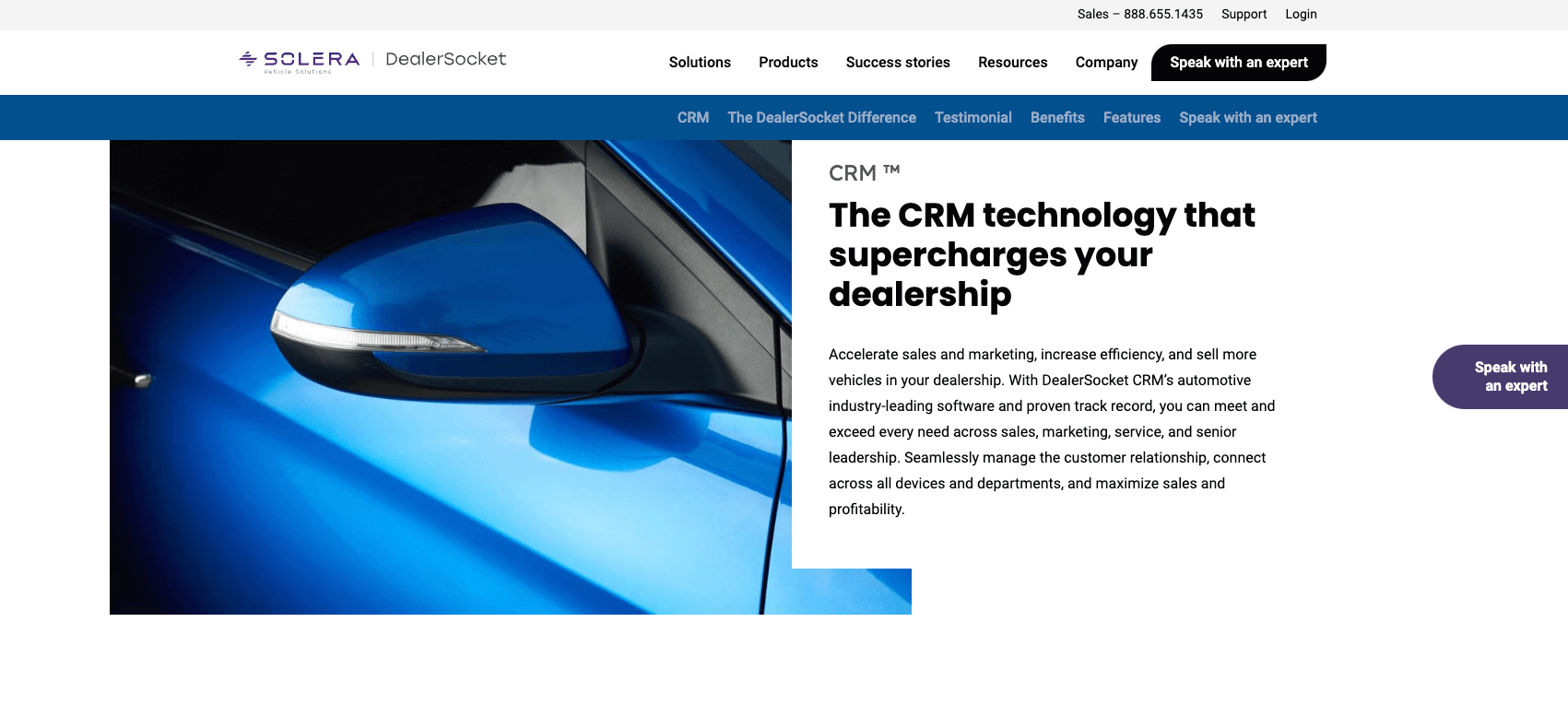
The DealerSocket automotive CRM app assists in monitoring performance and tracking staff efficiency while also automating communication with customers and lead follow-up processes.
Why I Like It
One solid reason to recommend DealerSocket is its focus on data-driven desking. This empowers dealerships to leverage real-time insights during negotiations, optimizing pricing strategies and maximizing profits on every sale. This can be particularly valuable in today’s competitive automotive market.
Key Features for Automotive
- A unified platform that integrates sales, marketing, service, and desking tools.
- Data-driven desking optimizes pricing in real-time.
- Digital retailing tools enhance online car shopping.
- Seamless communication fosters personalized outreach.
- Customer lifecycle management tracks interactions for stronger relationships.
Pros
- Saves time with a user-friendly interface and automated workflows.
- Data-driven insights empower informed decision-making for higher sales.
- Seamless buying journey with personalized communication and digital retail.
- Adapts to growing dealership needs with flexible configurations.
Cons
- Customer service is poor
Considerations for Small vs. Large Automotive Companies
While both small and large automotive businesses benefit from a CRM, their specific needs and considerations when choosing one can differ. Here’s a breakdown of some key factors to consider:
For Small Businesses (Independent Dealerships, Repair Shops):
- Budget: Small businesses typically operate on tighter budgets. Look for a CRM with a clear pricing structure and consider options with free trials or tiered plans that scale with your business growth.
- Ease of Use: Simplicity is key. Choose a CRM with an intuitive interface that requires minimal training for your staff.
- Focus on Core Features: Small businesses likely won’t require all the bells and whistles offered by enterprise-level CRMs. Focus on core functionalities like lead management, appointment scheduling, and basic marketing automation tools.
- Integration Options: Ensure the CRM integrates seamlessly with any existing software you use, such as accounting for inventory management systems. This minimizes data silos and streamlines operations.
For Large Businesses (Large Dealerships, Automotive Groups):
- Scalability: Large businesses require a CRM that can grow with them. Look for a CRM with robust features that can handle high volumes of data and complex workflows.
- Advanced Reporting and Analytics: Data-driven decision-making is crucial for large organizations. Choose a CRM with advanced reporting capabilities that provide insights into sales performance, customer behavior, and marketing campaign effectiveness.
- Customization Options: Large businesses often have unique needs. Consider a CRM that allows for customization, such as creating custom fields, dashboards, and workflows tailored to your specific processes.
- Security and Compliance: Large businesses handle sensitive customer data. Ensure the CRM offers robust security features and adheres to industry regulations.
Final Thoughts
Choose a tailored CRM system for your automotive business to unlock many benefits. Strengthen customer relationships, increase sales, and save costs. A CRM gives you a competitive edge in the changing auto industry. Consider your business factors, use resources, and pick a CRM for long-term success that’ll meet your auto business requirements.
FAQs
-
1) What is the best CRM for car dealerships?While there are plenty of CRM options in the market. The best fit for your car dealership will depend on your specific needs. Make sure to look at your requirements carefully and choose the right one that’ll suit your auto business.
-
2) What is CRM in the automotive industry?In the automotive world, a CRM is a specialized software solution that streamlines sales, marketing, and service for car dealerships, repair shops, and other automotive businesses. It helps them manage customer interactions throughout the entire car buying and ownership experience.
-
3) Which CRM software is best for a big automobile firm?I would consider the ProMax CRM, as it’s great for a big automobile firm since it’s scalable.

